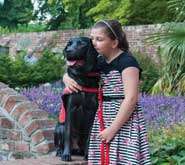Dogs could act as effective early warning system for patients with diabetes

(Phys.org) —Dogs that are trained to respond to their owners' hypoglycaemia could offer a very effective way to alert diabetic patients of impending lowered blood sugars. The findings, published in the journal PLOS ONE, is the first academic study to assess whether trained dogs could be used as a reliable early-warning system to monitor glycaemia control.
The Company of Animals-funded study, led by academics at the University of Bristol, investigated whether specially trained 'glycaemia alert dogs' could accurately and consistently detect the signs of low/high blood sugar in their owners and alert them when levels were reported to be outside their target range.
A total of seventeen dogs which have been trained by Medical Detection Dogs to alert their owners when their blood sugars were out of target range were studied. While some dogs had been specifically chosen for their potential to work as a 'glycaemia alert dog', mostly donated to and trained by the charity, others were clients' pets which had been trained in situ.
The research team collected data from the dogs owners' that allowed them to assess objectively whether trained dogs reliably respond to their owners' hypoglycaemic state, and whether owners experienced tightened glycaemic control, and wider psychosocial benefits.
The findings showed that since obtaining their dog, all seventeen clients studied reported positive effects including reduced paramedic call outs, decreased unconscious episodes and improved independence. Owner-recorded data showed that dogs alerted their owners, with significant, though variable, accuracy at times of low and high blood sugar.
Dr Nicola Rooney, the study's lead author and a research fellow in the University's School of Veterinary Sciences, said: "Despite considerable resources having been invested in developing electronic systems to facilitate tightened glycaemic control, current equipment has numerous limitations. These findings are important as they show the value of trained dogs and demonstrate that glycaemia alert dogs placed with clients living with diabetes, afford significant improvements to owner well-being including increased glycaemic control, client independence and quality-of-life and potentially could reduce the costs of long-term health care.
Eight out of the ten dogs (for which owners provided adequate records) responded consistently more often when their owner's blood sugars were reported to be outside, than within, target range. Comparison of nine clients' routine records showed significant overall change after obtaining their dogs, with seven clients recording a significantly higher proportion of routine tests within target range after obtaining a dog. The study confirms that trained detection dogs perform above chance level.
Dr Rooney added: "Some of the owners also describe their dogs respond even before their blood sugars are low but as they start to drop, so it is possible that the dogs are even more effective than this study suggests. While it is believed that dogs use their acute sense of smell to detect changes in the chemical composition of their owner's sweat or breath to respond to glycaemic control, further research is now needed to further understand how dogs carry out this amazing task."
More information: Rooney, N. et al. Investigation into the Value of Trained Glycaemia Alert Dogs to Clients with Type I Diabetes, PLOS ONE. www.plosone.org/article/info%3Adoi%2F10.1371%2Fjournal.pone.0069921
Journal information: PLoS ONE
Provided by University of Bristol


















